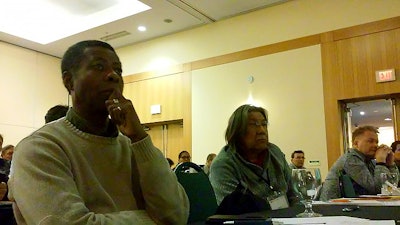
Dozens of representatives from Native Americans groups across North America traveled to Vancouver, British Columbia, for Native Nations Events conference on “The Canada Marijuana Boom: Opportunities in Indigenous Territory,” held Oct. 3-4.
The conference featured speakers ranging from cultivation gurus to native chiefs, from legal specialists to industry advocates, with panels focusing on the business opportunities and advantages native nations have when it comes to joining the cannabis industry.
And at the end of the two-day conference, the message was unanimous: Native American bands are ready to join the marijuana boom.
“I believe that cannabis, because of its nature of being a plant and having medical properties, a lot of first nations are very comfortable and understand it,” says Jonathon Araujo. He and his business partner Jacob Taylor are the founders of the Originative Partnership Development, “a socioeconomic development firm that supports corporate opportunity on-reserve through capacity building, access to capital, and access to sustainable economic investment opportunities,” according to the group’s website.
“I believe that First Nations have a very unique opportunity to be dominant players in this industry,” he continues. “And from this conference, a lot of nations are taking this very seriously and want to be leaders in this new industry.”
While the post-conference feeling was one of excitement, nearly every Native American band that attended the event had different concerns and questions coming in. Rosanne Casimir, of the Kamloops Indian Band, was fearful of the effect cannabis could have on her community. But now, she believes “it’s a better, healthier way to assist people who want to look for a holistic approach to treating their own health.”
With the large land base her community has, she says she will advise her council and chief to explore cannabis as a source of economic and social benefits, under the right circumstances, that is.
“[The band leaders] are very much stewards of the land,” Casimir says. “Any kind of business that does come on the reserve is going to have to be sustainable and meet the environmental components.”
For Hopeton Louden, CEO of Wesley First Nation in Moreley, Alberta, the concerns coming in were more about the health impact cannabis might have on his community.
He says his group has been hit especially hard by the opioid crisis. For him and his people, the cannabis industry represents more than a business opportunity, it represents a way out of addiction. And while he believes cannabis may be a solution to his community’s opioid problem, he is taking a cautionary approach to it.
“The evidence is definitely growing. I’m getting a lot of comfort in it. My concern is that this marijuana doesn’t become the … end all, be all because I know it’s not that,” he says.
As for the business of it, he will be exploring his options.
“I’ll always evaluate it. The production piece for the recreational use … that’s a much easier decision, saying, ‘yeah, I’d recommend we look at that,’ because it will be legalized,” Louden says.
Cultivators looking to partner with native groups should be aware that not everyone is looking to enter the cannabis industry as growers. Lloyd MacDougall, the band manager for Acadia First Nation, says his group has no interest in cultivation.
“I came in with a responsibility to the Acadia band to try and look at business opportunities, looking for a new line of business for the community that would create employment, economic benefits, training opportunities and financial reward in the long term that is then put back into the community,” he says.
Instead of launching a growing operation, which can require a tremendous amount of upfront capital, MacDougall says he’s still weighing the different options.
“Marijuana is the next ‘dot-com,’” MacDougall says, “so I came here looking for opportunities, but not knowing at all how that opportunity was going to present itself and still not 100-percent sure how we’re going to get into this game. …”
But one thing is for sure: Native nations will increasingly become key players in the cannabis industry.
Photo at top: Hopeton Louden, CEO of Wesley First Nation in Moreley, Alberta, says his band struggles with the opioid crisis. He came to the conference hoping to see if cannabis can be a solution. (Photo courtesy Brian MacIver)

























